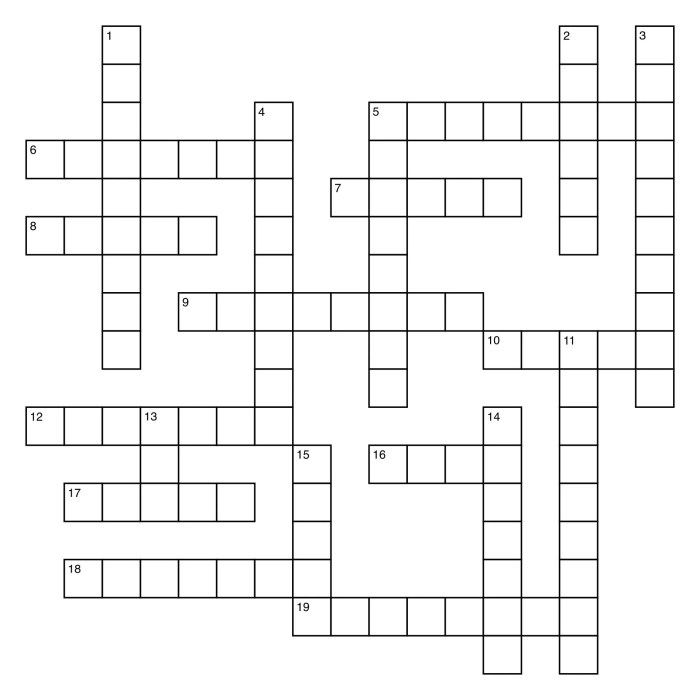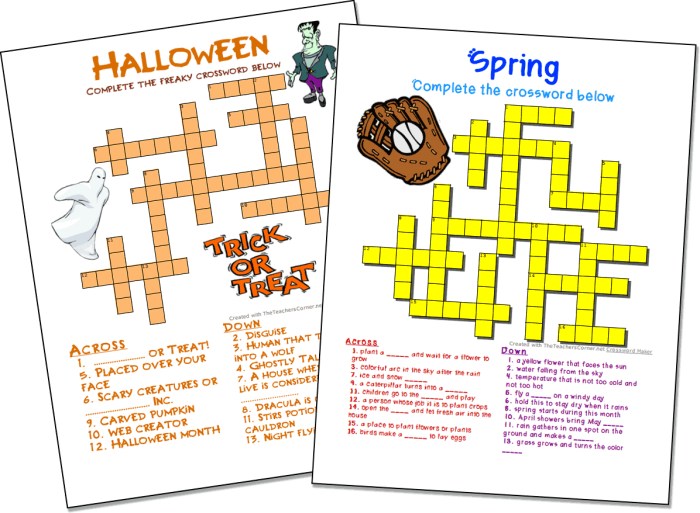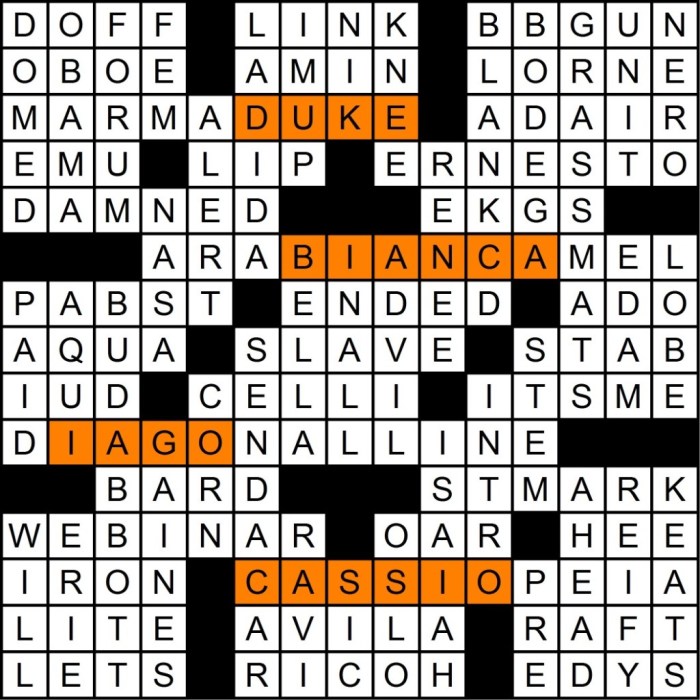Acting on one’s own crossword – Embark on an enthralling crossword adventure as we delve into the captivating world of “acting on one’s own.” Prepare to unravel cryptic clues, explore cultural nuances, and witness the ingenuity of crossword constructors as they weave this phrase into their puzzles.
In the realm of crosswords, “acting on one’s own” takes on a multifaceted meaning, inviting solvers to think independently, decipher hidden intentions, and navigate a labyrinth of wordplay. Join us as we uncover the strategies, significance, and cultural impact of this intriguing concept in the crossword universe.
Definition and Context

In the realm of crosswords, “acting on one’s own” refers to the scenario where a solver independently attempts to complete the puzzle without seeking external assistance.
Crossword clues that relate to this phrase often highlight the solver’s self-reliance and determination in tackling the puzzle.
Examples of Crossword Clues
- Going it alone in a puzzle (6 letters)
- Solving a crossword without help (5 letters)
- Doing a crossword solo (4 letters)
Crossword Solving Techniques
Solving crossword puzzles involving the phrase “acting on one’s own” requires a combination of logical reasoning and knowledge of synonyms and related terms. Here are some strategies to help you identify and fill in answers related to this concept:
Identifying Potential Answers:
- Look for clues that mention independence, autonomy, or self-reliance.
- Consider synonyms for “acting on one’s own,” such as “self-directed,” “unassisted,” or “autonomous.”
Filling in Answers:
- Use the number of letters provided in the grid to determine the possible length of the answer.
- Try filling in common prefixes or suffixes related to independence, such as “self-,” “un-,” or “-ly.”
- Consider cross-referencing with other clues in the puzzle that may provide additional context or related terms.
Historical and Cultural Significance

The phrase “acting on one’s own” has a rich historical and cultural significance in the context of crosswords. It refers to the act of solving a crossword puzzle independently, without seeking assistance or collaborating with others.
In the early days of crosswords, which originated in the early 20th century, solving puzzles was considered a solitary activity. Crosswords were often published in newspapers and magazines, and enthusiasts would spend hours trying to complete them on their own.
The ability to solve a crossword puzzle independently was seen as a mark of intelligence and skill.
Cultural Significance
Over time, the phrase “acting on one’s own” took on a cultural significance in many countries. In some cultures, it became associated with the idea of self-reliance and independence. Solving a crossword puzzle independently was seen as a way to demonstrate one’s ability to think critically and solve problems without external help.
Historical Significance
Historically, the phrase “acting on one’s own” has also been used to describe the work of crossword constructors. Crossword constructors are the individuals who create the puzzles that are published in newspapers and magazines. In the early days of crosswords, constructors often worked independently, creating puzzles that were challenging and engaging for solvers.
Today, the phrase “acting on one’s own” continues to be used in the context of crosswords. It is a reminder of the historical and cultural significance of solving crossword puzzles independently, and it is a testament to the enduring popularity of this challenging and rewarding pastime.
Solving a crossword on your own can be a rewarding experience, but sometimes you need a little help. That’s where training day pushed in gif comes in. This website provides a searchable database of crossword clues and answers, so you can find the help you need to complete your puzzle.
Whether you’re a seasoned crossword solver or just starting out, training day pushed in gif is a valuable resource. So next time you’re stuck on a clue, don’t give up! Just head over to training day pushed in gif and get the help you need to keep solving.
Examples from Popular Culture

Popular culture offers numerous examples of characters or situations that embody the concept of “acting on one’s own.” These examples can provide crossword constructors with inspiration for creating clues related to this phrase.
One such example is the character of Katniss Everdeen from the Hunger Gamesseries. Katniss is a strong and independent young woman who is forced to rely on her own instincts and abilities to survive in a dangerous and oppressive world. She is a powerful symbol of the human spirit and the importance of taking action even when faced with overwhelming odds.
Examples in Film, Acting on one’s own crossword
- In the film 12 Angry Men, a lone juror stands up for his beliefs and convinces the other jurors to acquit the defendant, despite the overwhelming evidence against him.
- In the film Schindler’s List, Oskar Schindler risks his own life to save over a thousand Jews from the Holocaust.
- In the film The Shawshank Redemption, Andy Dufresne escapes from prison after 19 years by digging a tunnel with a rock hammer.
Examples in Literature
- In the novel To Kill a Mockingbird, Atticus Finch defends a black man accused of raping a white woman, even though he knows it will be an unpopular decision.
- In the novel The Great Gatsby, Jay Gatsby throws lavish parties in an attempt to win back the love of his life, Daisy Buchanan.
- In the novel The Catcher in the Rye, Holden Caulfield rebels against the phoniness and hypocrisy of the adult world.
Crossword Construction: Acting On One’s Own Crossword

Crafting crossword puzzles that feature clues related to “acting on one’s own” requires a combination of knowledge, creativity, and attention to detail. Here are some guidelines to help you construct engaging puzzles that test solvers’ understanding of this concept:
Creating Original and Engaging Clues
- Use synonyms and related terms:Instead of simply using the phrase “acting on one’s own,” explore synonyms such as “unilateral,” “self-directed,” or “independent.”
- Reference specific examples:Include clues that refer to historical figures, literary characters, or current events that demonstrate the concept of acting on one’s own.
- Employ wordplay and puns:Introduce wordplay or puns that hint at the idea of self-reliance or autonomy, making the clues more challenging and enjoyable to solve.
- Consider different clue lengths:Vary the lengths of your clues to accommodate different levels of solver expertise. Short clues can be more direct, while longer clues can provide more context or wordplay.
- Test for different types of knowledge:Include clues that test solvers’ knowledge of history, literature, pop culture, and current events related to the concept of acting on one’s own.
FAQ Corner
What is the significance of “acting on one’s own” in crosswords?
It encourages solvers to think independently, interpret clues creatively, and navigate wordplay challenges without relying solely on external sources.
How can I improve my crossword-solving skills related to this phrase?
Practice identifying synonyms, antonyms, and double meanings. Pay attention to context and wordplay, and don’t be afraid to think outside the box.
What are some examples of famous characters who embody the concept of “acting on one’s own”?
Sherlock Holmes, James Bond, and Katniss Everdeen are fictional characters known for their independent decision-making and self-reliance.